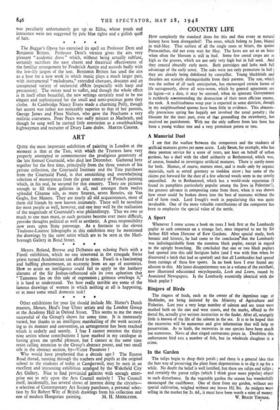A Manurial Duel I see that .the warfare between the
composters and the students of artificial manures. grows yet more acute. Lady Seton, for example, who has done yeoman service for a score of years, not least on behalf of urban gardens, has a duel with the chief authority at Rothamsted, which was, of course, founded to investigate artificial manures. There is surely room for both. Humus, of course, matters most, and is made only by organic materials, such as rotted greenery or trodden straw ; but some of the claims put forward for the dust of a few selected weeds seem to me utterly unjustified. As to Rothamsted, which has a world-wide reputation (I found its pamphlets particularly popular among the Jews in Palestine!), the greatest advance in composting came from there, when it was shown how straw could be broken down into the best of manures without the aid of farm stock. Lord Iveagh's work in popularising this was quite invaluable. One of the more valuable contributions of the composter has been to emphasise the special value of the nettle.






























 Previous page
Previous page